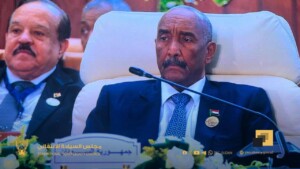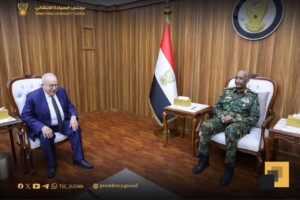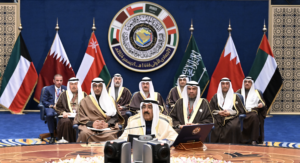PM Hamdok announces Sudan’s new govt
Prime Minister Abdallah Hamdok announced the members of the new transitional government cabinet in a press conference yesterday evening. The new cabinet brings in a total of 25 ministers, many of whom are part of the rebel parties that signed the Juba Peace Agreement.
 PM Hamdok announces new gvt members in a press conference in Khartoum yesterday (SUNA)
PM Hamdok announces new gvt members in a press conference in Khartoum yesterday (SUNA)
Prime Minister Abdallah Hamdok announced the members of the transitional government's new cabinet in a press conference in Khartoum yesterday evening. The new cabinet brings in a total of 25 ministers, many of whom are part of the rebel parties that signed the Juba Peace Agreement.
Hamdok stated that the formation was achieved through a political consensus to avoid a governmental ‘collapse’.
The formation of a new government provides more agency to the rebel parties that signed the Juba Peace Agreement. The Forces for Freedom and Chance (FFC) presented their list for 17 ministerial positions earlier this month. Last month, there were still disagreements among the members of the FFC regarding the nomination of new ministers.
The PM explained that an agreement will be signed in the upcoming week to address five key issues. These include a unified vision of the economy, the implementation of the Juba Peace Agreement, and agreements regarding foreign relations, justice, and the structure of military and civil state institutions.
All participating forces will be included in the agreement.
Hamdok further stressed that the ministers were nominated on the basis of strict selection-criteria, including qualification, experience, political awareness, and integrity. He also explained that some ministries were divided into separate ministries so that they could focus more on issues related to the economy.
“We are close to achieving a shift in the economy", Hamdok said.
The PM denied objecting to the nomination of Jibril Ibrahim, head of the Darfuri Justice and Equality Movement (JEM), as Minister of Finance, as suggested on social media. He said that he considered the participation of Jibril Ibrahim and all other parties as beneficial and helpful in overcoming differences.
Hamdok also explained that the establishment of the Legislative Council will open up possibilities to address the issues Sudan currently faces. He called on the FFC to form a Legislative Council that would achieve the goals of the revolution.
In his statement, he also confirmed the plan to appoint the state governors on 15 February and the Legislative Council on 25 February.
Volker Perthes, Head of the United Nations Integrated Transition Assistance Mission in Sudan (UNITAMS), congratulated PM Hamdok on the formation of the new government and the new members on their appointments. He wishes them "courage and success in their common commitment to Sudan's path towards political transition, peace, and economic development".
Perthes further called the inclusion of the Juba peace partners an "important milestone" in Sudan's political transition. He stressed that UNITAMS looks forward to working with the new government and expressed his hope that the Sudanese authorities will establish an 'inclusive' Legislative Council by February 25, with the "meaningful representation of women" as expressed in the Constitutional Document.
The new cabinet
A few ministers will hold on to their post. Maj Gen Yasin Ibrahim will remain in place as Minister of Defence, Intisar Segheroun as Minister of Higher Education.
The FFC also re-nominated Nasreldin Abdelbari as Minister of Justice and Yasir Abbas as Minister of Irrigation and Water Resources.
The list of new ministers includes Maryam El Sadig, Co-President of the National Umma Party (NUP) and daughter of the late El Sadig El Mahdi, as Minister of Foreign Affairs, replacing Omar Gamareldin.
The NUP nominated members for three other ministerial positions. Taher Harbi will replace Eisa Osman as Minister of Agriculture and Natural Resources, and Jaden Ali will become Minister of Energy and Oil. Nasreldin Mofareh will remain Minister of Religious Affairs and Endowments.
Khaled Omar, former Deputy Head of the Sudanese Congress Party (SCP), will become Minister of Cabinet Affairs. Fellow SCP member Ibrahim El Sheikh will become Minister of Industry and Trade.
Former Minister of Federal Governance from the Arab Socialist Baath Party, Yousef El Dei, will become Minister of Youth and Sports. Butheina Dinar from the Sudan People’s Liberation Movement-North (SPLM-N Agar) will replace him as Minister of Federal Governance.
Jibril Ibrahim, leader of the Justice and Equality Movement (JEM) will replace current acting minister Heba Mohamed as Minister of Finance. Mutasim Ahmed Saleh, another member of the JEM, will become Minister of Social Development.
Lt Gen Ezzeldin El Sheikh will replace Lt Gen El Tereifi Idris as Minister of Interior Affairs.
Omar El Najeeb will become Minister of Health, replacing current acting minister Osama Abdelrahim.
Hamza Baloul from the Unionist Alliance will replace Feisal Mohamed Saleh as Minister of Information, Culture, and Tourism. Fellow UA member Hashem Hasabelrasoul will become Minister of Communications and Digital Transformation.
Mohamed Abunumou from the Sudan Liberation Movement under Minni Minawi (SLM-MM) will become Minister of Mining. Mohamed Ibrahim will become Minister of Investment and International Cooperation, and Dr Ali Jido will become Minister of Trade.
Taysir El Nourani from the Sudanese Baath Party was appointed as Minister of Labour and Administrative Reform.
Mirghani Mousa from the Beja Congress will become Minister of Transport. Hafez Nabi from the Sudan Revolutionary Front (SRF) will become Minister of Livestock and Fisheries.











 and then
and then